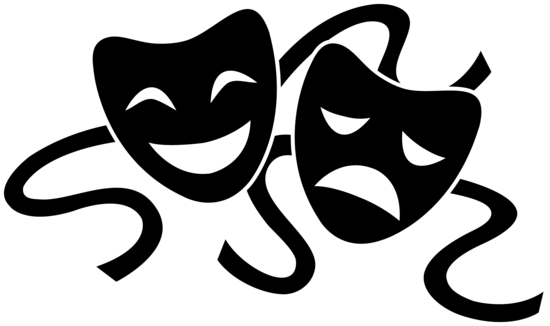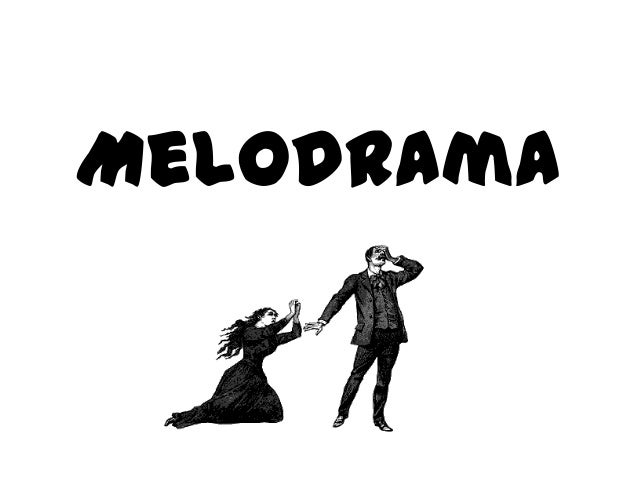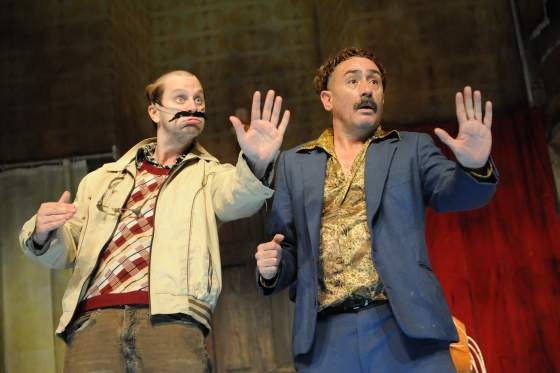نمایشنامه کلاسیک و رنسانس - فصل سوم
Chapter Three: Tragedy and Comedy

Thalia and Melpomene: Zeus’s Daughters
-Comedy is funny; tragedy is sad. Comedy has a happy ending, tragedy an unhappy one.
-The typical ending for comedy is a marriage; the typical ending for tragedy is death.

Aristotle (384 – 322 BC)
-The first great theorist of dramatic arts was Aristotle whose discussion of tragedy in Poetics has dominated critical thought ever since.
Definition of Tragedy:
-A tragedy is the imitation in dramatic form of an action that is serious and complete, with incidents arousing pity and fear wherewith it effects a catharsis of such emotions.
-The language is pleasurable and appropriate.
-The chief characters are noble personages (“better than ourselves”) and the actions they perform are noble actions.
-The plot involves a change in the protagonist’s fortune, in which he usually falls from happiness to misery.
-The protagonist, though not perfect, is hardly a bad person; his misfortunes result not from character deficiencies but rather from what Aristotle calls hamartia (tragic flaw), a criminal act committed in ignorance of some material fact or even for the sake of a greater good.
-A tragic plot has organic unity: the events follow not just after one another but because of one another.
-The best tragic plots involve a reversal (a change from one state of things within the play to its opposite) or a discovery (a change from ignorance to knowledge) or both.

Catharsis: “Purgation” — Emotional Release
-“Tragic Flaw”: some fault of character such as inordinate ambition, quickness to anger, a tendency to jealousy, or overweening pride.
Jealousy: Othello’s Hamartia (Tragic Flaw)

Ambition: Macbeth’s Hamatia (Tragic Flaw)
Tragic Hero:
1. Tragic hero is a man of noble stature. He is not an ordinary man. In Greek and Shakespearean tragedy, he is usually a prince or a king.
2. The tragic hero is good, though not perfect, and his fall results from his committing what Aristotle calls “an act of injustice” (hamatia) either through ignorance or from a conviction.
3. The hero’s downfall is his own fault, the result of his own free choice — not the result of pure accident or someone else’s villainy or some overriding malignant fate.
4. Nevertheless, the hero’s misfortune is not wholly deserved. The punishment exceeds the crime.
5. Yet the tragic fall is not pure loss. Though it may result in the protagonist’s death, it involves, before his death, some increase in awareness, some gain in self-knowledge—“discovery”—a change from ignorance to knowledge.
6. Though it arouses solemn emotions—pity and fear, says Aristotle, but compassion and awe might be better terms—tragedy, when well performed, does not leave its audience in a state of depression.

Macbeth as a Tragic Hero
Comedy:
1.Scornful Comedy: laughing comedy
2.Romantic Comedy: smiling comedy
-Scornful or satiric comedy is the older and probably still the more dominant.
-Where tragedy emphasizes human greatness, comedy delineates human weakness. Where tragedy celebrates human freedom, comedy points up human limitations.
-Because comedy exposes human folly, its function is partly critical and corrective.
-Comedy reveals to us a spectacle of human ridiculousness that it makes us want to avoid.
-Romantic comedy puts its emphasis upon sympathetic rather than ridiculous characters.
-The norms of comedy are primarily social: Where tragedies tend to isolate their protagonists to emphasize their uniqueness, comedies put their protagonists in the midst of a group to emphasize their commonness.

Melodrama: like tragedy attempts to arouse feelings of fear and pity, but it does so ordinarily through cruder means. The conflict is an oversimplified one between good and evil depicted in absolute terms.

Deus ex machina: Rescue by an act of divine intervention.

Farce: More consistently than comedy, is aimed at rousing explosive laughter. But the means are cruder. The conflicts are violent and usually at the physical level.
+ نوشته شده در جمعه ۲۴ مهر ۱۳۹۴ ساعت توسط سید شهاب الدین ساداتی
|

 سید شهاب الدین ساداتی
سید شهاب الدین ساداتی